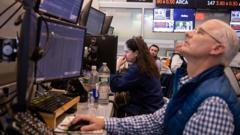On Wednesday, U.S. stock markets experienced dramatic gains as President Trump announced a suspension of high tariffs affecting many international goods, while simultaneously elevating tariffs on china-bound imports.
US Markets Surge as Trump Signals Tariff Suspension on Key Trade Partners

US Markets Surge as Trump Signals Tariff Suspension on Key Trade Partners
US stocks witness an unprecedented upswing following President Trump's decision to pause certain tariffs, while escalating duties on China.
In a surprising turn of events, the U.S. stock market experienced its most significant surge since 2008, primarily attributed to President Donald Trump’s recent announcement to suspend steep tariffs on various trade partners and introduce a 10% import tax instead. This decision marks a notable shift from the administration's prior aggressive tariff strategy.
The S&P 500 index surged by 9.5% on Wednesday, reflecting investor relief and optimism after a week plagued with uncertainties over trade policies. Trump's new tariff structure will allow negotiations with countries willing to engage, yet he confirmed a sharp increase in tariffs on Chinese imports to a staggering 125%, effective immediately.
This announcement comes merely a day after new tariffs on trade partners, including Vietnam, which faced a hefty 46% increase on imports, had taken effect. Analysts had forecasted a more restrained approach to tariffs, resulting in a sudden 10% drop in the S&P before the market rebounded following Trump's new directive.
Paul Ashworth, chief North American economist at Capital Economics, emphasized that the President’s decision was a necessary adjustment given the recent volatility in the market, particularly after bonds signal concern for the economy. Ashworth predicts that while renegotiations with China are likely, an outright rollback of tariffs may not be feasible in the short term.
Despite the exhilarating market rally, major U.S. indexes remained lower than their pre-announcement levels, with the S&P 500 down about 3% year-to-date. The Dow and Nasdaq also saw considerable increases of over 7.8% and 12% respectively, with significant contributions from companies like Nike and Apple, witnessing gains of 11% and 15%.
While banks such as Goldman Sachs initially forecast a recession due to tariffs, they quickly revised their expectations after Trump’s announcement, highlighting an ongoing uncertainty within economic projections as the impact of rising tariffs on imports from China continues to loom large. The American Apparel and Footwear Association noted China's significant role, supplying 60% of U.S. footwear imports and 36% of clothing imports last January.
Trump, while addressing the political pressure resulting from the previous tariff policies, acknowledged the adverse effects and hinted at individual exemptions for companies facing challenges. He reaffirmed his intent to maintain tariffs on strategic sectors including automobiles, steel, and aluminum but expressed a desire to negotiate with China, underlining an ongoing tension in trade relations.
As the dust settles from this market rollercoaster, Trump's unexpected move highlights the complexities of navigating international trade, as influential figures like Tesla's Elon Musk and billionaire investors pressure the administration for more strategic tariff decisions, leaving investors and traders bracing for what lies ahead.




















